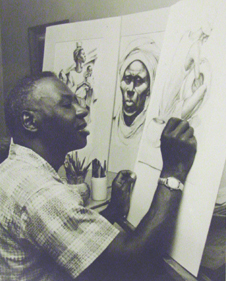
Elton Clay Fax, a prolific African-American cartoonist, author, and illustrator, was born on October 9, 1909, in Baltimore, Maryland. His parents were Mark Oakland Fax, a clerk, and Willie Estelle Fax, a seamstress. Elton’s younger brother, Mark, was a music prodigy who worked as a composer later in life. Elton attended Claflin College, a historically black college in South Carolina and then transferred to Syracuse University in New York where he earned a Bachelor of Fine Arts (BFA) degree in 1931. In 1929 he married Grace Elizabeth Turner, with whom he had three children.
In 1935 Fax returned to Claflin College to teach art. After one year, he left Claflin and began teaching with the federal government’s Works Progress Administration (WPA) in New York City until 1940, at which point he became a freelancer. Fax’s work gathered attention at several art showings, including a 1932 solo exhibition in Baltimore where two nude paintings stirred controversy; the Baltimore Art Museum in 1939; and the 1940 American Negro Exposition in Chicago, Illinois.
Several black newspapers ran Susabelle, Fax’s popular newspaper comic strip, starting in 1942. From 1949, Fax spent seven years delivering “chalk-talks,” stories accompanied by live illustrations. Fax and his family frequently traveled, living in Mexico from 1953 to 1956 and later visiting South America. During the following decades, Fax’s travels took him around the world, particularly to Africa. In his visits to African nations, he delivered his famous “chalk-talks,” often on the topic of the American civil rights struggle.
Throughout his career, Fax illustrated over thirty books and numerous magazine articles. He wrote extensively on black culture as well, publishing several books and regularly contributing essays to a variety of magazines and newspapers. West African Vignettes (1960), his first book, detailed his African travels; later, he wrote Through Black Eyes (1974) about his journeys in East Africa and the Soviet Union. Other notable books include Garvey (1972), a biography of Black Nationalist Marcus Garvey, and Seventeen Black Artists (1971), for which he won the Coretta Scott King Award.
Many of Fax’s writings and artwork from 1930–1972 were compiled into the Elton Fax Papers, located in the archives of the New York Public Library, Boston University in Massachusetts, and Syracuse University. Elton Fax passed away on May 13, 1993, in Queens, New York.

